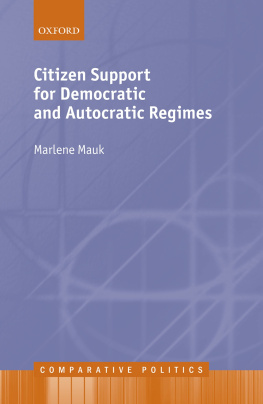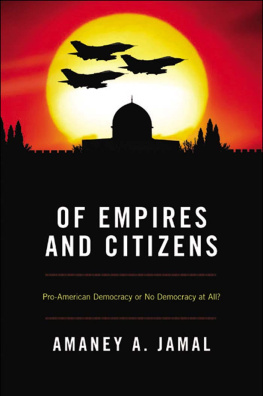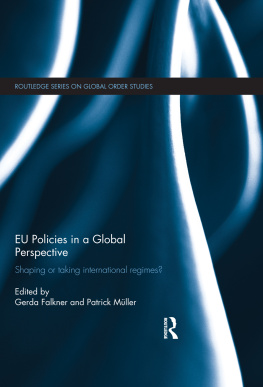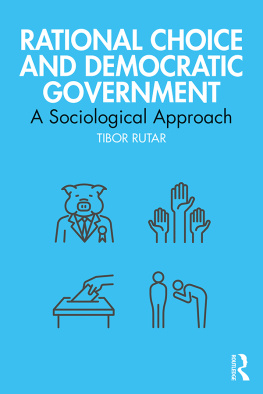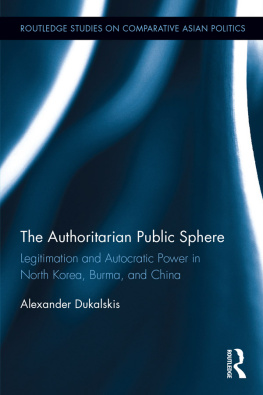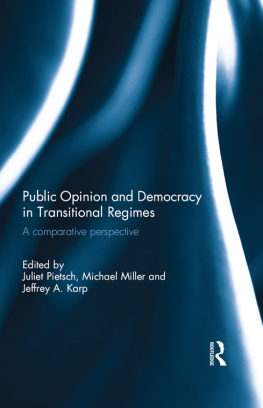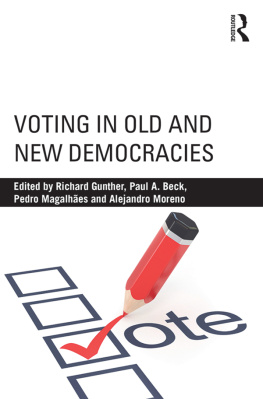Comparative Politics
Comparative Politics is a series for researchers, teachers, and students of political science that deals with contemporary government and politics. Global in scope, books in the series are characterized by a stress on comparative analysis and strong methodological rigour. The series is published in association with the European Consortium for Political Research. For more information visit www.ecprnet.eu
The series is edited by Susan Scarrow, Chair of the Department of Political Science, University of Houston, and Jonathan Slapin, Professor of Political Institutions and European Politics, University of Zurich.
OTHER TITLES IN THIS SERIES
Inequality After the Transition
Political Parties, Party Systems, and Social Policy in Southern and Postcommunist Europe
Ekrem Karako
Democracy and the Cartelization of Political Parties
Richard S. Katz and Peter Mair
From Party Politics to Personalized Politics?
Party Change and Political Personalization in Democracies
Gideon Rahat and Ofer Kenig
Multi-Level Electoral Politics
Beyond the Second-Order Election Model
Sona N. Golder, Ignacio Lago, Andr Blais, Elisabeth Gidengil, and Thomas Gschwend
Organizing Political Parties
Representation, Participation, and Power
Edited by Susan E. Scarrow, Paul D. Webb, and Thomas Poguntke
Reforming Democracy
Institutional Engineering in Western Europe
Camille Bedock
Party Reform
The Causes, Challenges, and Consequences of Organizational Change
Anika Gauja
How Europeans View and Evaluate Democracy
Edited by Mnica Ferrn and Hanspeter Kriesi
Faces on the Ballot
The Personalization of Electoral Systems in Europe
Alan Renwick and Jean-Benoit Pilet
The Politics of Party Leadership
A Cross-National Perspective
Edited by William P. Cross and Jean-Benoit Pilet

Great Clarendon Street, Oxford, OX2 6DP, United Kingdom
Oxford University Press is a department of the University of Oxford. It furthers the Universitys objective of excellence in research, scholarship, and education by publishing worldwide. Oxford is a registered trade mark of Oxford University Press in the UK and in certain other countries
Marlene Mauk 2020
The moral rights of the author have been asserted
First Edition published in 2020
Impression: 1
All rights reserved. No part of this publication may be reproduced, stored in a retrieval system, or transmitted, in any form or by any means, without the prior permission in writing of Oxford University Press, or as expressly permitted by law, by licence or under terms agreed with the appropriate reprographics rights organization. Enquiries concerning reproduction outside the scope of the above should be sent to the Rights Department, Oxford University Press, at the address above
You must not circulate this work in any other form and you must impose this same condition on any acquirer
Published in the United States of America by Oxford University Press
198 Madison Avenue, New York, NY 10016, United States of America
British Library Cataloguing in Publication Data
Data available
Library of Congress Control Number: 2019954006
ISBN 9780198854852
ebookISBN 9780192597137
Printed and bound in Great Britain by Clays Ltd, Elcograf S.p.A.
Links to third party websites are provided by Oxford in good faith and for information only. Oxford disclaims any responsibility for the materials contained in any third party website referenced in this work.
To my mother, Christa.
Acknowledgments
This book has been in the making for many years, starting out as work on my dissertation and progressing into a book for almost two years after I finished my PhD. During this period, a great number of people have helped me develop the core ideas of this book, conduct the research therein, and present the findings in a clear and coherent fashion. I would like to gratefully acknowledge my intellectual and other relevant debts to these people.
I am most grateful to Edeltraud Roller, my dissertation advisor, for spending hours on end discussing the core ideas presented in this book and to ensure my work would be as rigorous as possible. My work has benefited greatly from her sharp mind and I deeply appreciate all the advice she was happy to offer even long after I had graduated.
During my time at Johannes Gutenberg University Mainz and, subsequently, at GESISLeibniz Institute for the Social Sciences Cologne, many colleagues have had their share in helping me write this book. I consider myself lucky to work in such stimulating environments and with such wonderful colleagues. I would particularly like to acknowledge the assistance and support of the following: Stephanie Bergbauer, for reading the entire manuscript and for offering both insightful comments on the core arguments and incredibly helpful stylistic advice; Nils Steiner, my longest-standing office mate, for listening to my ramblings and helping me straighten out my thoughts on countless occasions; Carl Berning, Jasmin Fitzpatrick, Sven Hillen, Mathias Lotz, and Kati Schiefer, for lending me their ears with any questions and grievances I might have had; and Heidi Schulze, for having my back whenever time was scarce and workload was high. Your unrelenting support and friendship has been invaluable to me.
I am further indebted to Theresa Bernemann, Ayse Gn, and Tizian Lehnert for providing excellent research assistance and helping me organize literature, recode data, format tables, and check references.
I would also like to thank Chris Welzel for offering his endorsement and guidance during the proposal stage, and Ingvill C. Mochmann for her helpful advice during revisions. Special thanks go to Jrgen W. Falter, who introduced me to political-culture research early on, and to Gerd Mielke, who has always been there when it mattered.
The book is based on public opinion surveys conducted by six large-scale research programs as well as aggregate data from a number of sources. I am deeply indebted to the following organizations and individuals for collecting this data and for making it publicly available: Afrobarometer; AmericasBarometer/LAPOP; Arab Barometer; Asian Barometer Project; Latinobarmetro; World Values Survey; Varieties-of-Democracy Institute; Freedom House; World Bank; The Quality of Government Institute; Frederick Solt; The Political Terror Scale Project/Mark Gibney, Linda Cornett, Reed M. Wood, Peter Haschke, and Daniel Arnon; Alberto Alesina, Arnaud Devleeschauwer, William Easterly, Sergio Kurlat, and Romain Wacziarg; United Nations Development Programme; United Nations Conference on Trade and Development; and the Central Intelligence Agency.
Oxford University Press has been an indispensable source of support. I would especially like to thank Dominic Byatt for providing guidance and reassurance throughout the entire process, and Sathiya Krishnamoorthy for her assistance in the publishing process, as well as Duncan Baylis for his thorough copy-editing. I would also like to express my gratitude to two anonymous reviewers, who took the time to read the entire manuscript and provide me with substantive comments and valuable suggestions for revision; their feedback much improved the book. My greatest appreciation goes out to Ferdinand Mller-Rommel. This entire publishing project would have been impossible without his unwavering support and encouragement.

